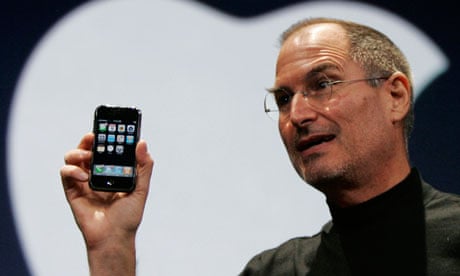There was a time, not so long ago, when Apple was heralded as the saviour of the publishing industry. Steve Jobs's company would miraculously convince a generation to pay for online news. Its "Jesus tablet", the iPad, would be so popular with consumers that they would be seduced into paying for a new generation of publishers' apps.
That was until last week, when Apple's relationship with the media industry came to a head. With a new set of terms and conditions for digital subscriptions, described as "brazen" by one national newspaper executive, publishers' inherent wariness towards the company quickly turned into a deep mistrust.
The drama, though, was yet to begin. While media bosses were still getting their heads around Apple's strict new regime, Google fired a shot across its rival's bow with its own, very different attempt to woo newspaper and magazine publishers.
Within 24 hours, the landscape of online news looked radically different. Apple's natural allure for media types – it commands a 70%-plus chunk of the nascent tablet market – was shaken. And Google had potentially opened the door to more paywall products.
Apple's new terms of service dictated that the company keeps 30% of revenue from the growing number of publishers in its App Store, including the New York Times, Daily Telegraph, and the Guardian. Publishers can set the price and duration of a subscription, but they are not permitted to offer cheaper deals outside Apple's walled garden. On top of that, all the lucrative customer information stays with Apple.
Google's One Pass, by contrast, allows publishers to charge for as much or as little content as they wish, on mobiles, online, and on tablet computers. Set clearly in opposition to Apple's monolithic approach, Google allows publishers to set their own payment plan, keep 90% of the revenue, and all of the lucrative customer information.
But Google's strategy is not without flaws – the announcement was clearly rushed out a day after Apple's statement, in an effort to recruit publishers to its Android platform.
The distinction could hardly be starker. And if Apple could feel its ears burning on Thursday, it should look to Heathrow, where an influential industry body, the International Newsmedia Marketing Association (INMA), hosted a hastily convened summit with digital executives from almost 60 news organisations, including the Daily Telegraph, Le Monde, Dow Jones and Axel Springer.
Mark Challinor, Telegraph Media Group's director of mobile, was there. "Apple's new policy has certainly made publishers sit up and say, 'Is 30% fair?'," he says. "We've got no problem with paying Apple a fee, but the question in light of Google's One Pass is, is 30% fair?
"I don't think this is about Apple trying to be forceful or anti-newspapers, it's just a case of them learning as they go – they've not had customers like us before. There's an assumption that Apple have all the answers – they really don't," adds Challinor, who is also the European board director of the INMA. "There is a definite need for a dialogue, not a monologue, with Apple here."
The Financial Times, which generated a tenth of its new digital subscriptions from its iPad app last year, expressed "concerns over changes to an approach that has so far worked well for our readers and the broader publishing ecosystem around tablet devices, and that may compromise our business model".
Although Google's rushed launch seems to have rankled with some publishers – the Daily Mail's parent company Associated Newspapers, Google's only publicly named UK launch partner, wasn't even ready to discuss its One Pass plans last week – Apple's move appears to have done more lasting damage.
The iPad-maker's new demands brought to the fore lingering concerns about its zealously enforced philosophy. "From the conversations I've had with publishers, Apple should experience some doubt [about its subscription policy]," says James McQuivey, a digital media analyst at Forrester. "The way Apple has approached this is particularly offputting for publishers – dictating terms and pulling the rug out from under their feet.
"That has definitely affected the way publishers will view Apple from now on. We're not going to see any more major publishers – except for maybe Rupert Murdoch – stand up and say Apple is doing us a favour. Those days are gone."
The reverberations of Apple's five-paragraph announcement were keenly felt elsewhere across the creative industries. The nascent music subscription market, with the likes of Spotify, We7 and Rhapsody, was immediately rendered "economically unviable", according to Steve Purdham, chief executive of the Oxford-based We7. Richard Jones, the co-founder of Last.fm, put it more bluntly: "Apple just fucked over online music subs for the iPhone."
"It's no surprise that the response across the board is a feeling of absolute shock and horror," Purdham says. "But if you take a step back it's not an unexpected tactic. All Apple's doing is putting a stake in the ground and saying, 'We have a platform, you operate on that platform, so we would like to have a share of your revenue please'."
The INMA will reconvene its industry-wide meeting in May. In the meantime Apple is expected to come under intense pressure from publishers to reconsider its terms of service, in the light of Google's less prescriptive way of doing things.
"In the big picture, this is very interesting," McQuivey says. "Content companies are wary of both Apple and Google – they don't want either to win. But I would characterise this week as a footnote in chapter one – with 10 chapters left to go."

Comments (…)
Sign in or create your Guardian account to join the discussion